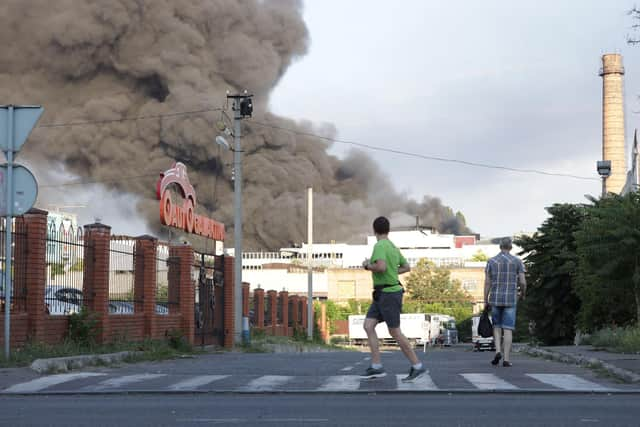Ukraine conflict: Russian missiles hit Odesa port hours after grain export deal agreed
and live on Freeview channel 276
The military targeted Ukraine’s main port of Odesa – through which grain shipments would take place – with cruise missile strikes.
The Ukrainian Foreign Ministry denounced Saturday’s strike as “spit in the face” of Turkey and the United Nations, which brokered the agreements.
Advertisement
Hide AdAdvertisement
Hide AdTwo Russian missiles hit the port’s infrastructure and Ukrainian air defences brought down two others, the Ukrainian military said. It did not specify the damage or say whether the strike caused casualties.
Foreign Ministry spokesman Oleg Nikolenko said: “It took less than 24 hours for Russia to launch a missile attack on Odesa’s port, breaking its promises and undermining its commitments before the UN and Turkey under the Istanbul agreement.
“In case of non-fulfilment, Russia will bear full responsibility for a global food crisis.”
Russia’s military has also fired a barrage of missiles at an airfield in central Ukraine, killing at least three people, while Ukrainian forces launched rocket strikes on river crossings in a Russian-occupied southern region.
Advertisement
Hide AdAdvertisement
Hide AdThe attacks on key infrastructure on Saturday – the 150th day of Russia’s war in Ukraine – marked new attempts by the warring parties to tip the scales of the grinding conflict in their favour.


In Ukraine’s central Kirovohradska region, 13 Russian missiles struck an airfield and a railway facility.
Governor Andriy Raikovych said at least one serviceman and two guards were killed. The regional administration reported the strikes, near the city of Kirovohrad, wounded another 13 people.
In the southern Kherson region, which Russian troops seized early in the invasion, Ukrainian forces preparing for a potential counter-offensive fired rockets at Dnieper River crossings to try to disrupt supplies to the Russians.
Advertisement
Hide AdAdvertisement
Hide AdThe new attacks came hours after Moscow and Kyiv signed deals with the United Nations and Turkey intended to avert a global food crisis – with Russian warheads hitting Odessa and ports despite the agreement.
The agreements clear the way for the shipment of millions of tons of Ukrainian grain and some Russian exports of grain and fertiliser held up by the war.
The UK’s Ministry of Defence (MoD) has said that Russian supply lines remain stretched as fighting continues.
An update from the MoD read: “In the last 48 hours, heavy fighting has been taking place as Ukrainian forces have continued their offensive against Russian forces in Kherson Oblast, west of the River Dnipro.
Advertisement
Hide AdAdvertisement
Hide Ad"In the last 48 hours, heavy fighting has been taking place as Ukrainian forces have continued their offensive against Russian forces in Kherson Oblast, west of the River Dnipro.
"Simultaneously, the supply lines of the Russian force west of the Dnipro are increasingly at risk."
Ukrainian President Volodymyr Zelensky said in his nightly video address on Friday that the agreements offer “a chance to prevent a global catastrophe – a famine that could lead to political chaos in many countries of the world, in particular in the countries that help us”.